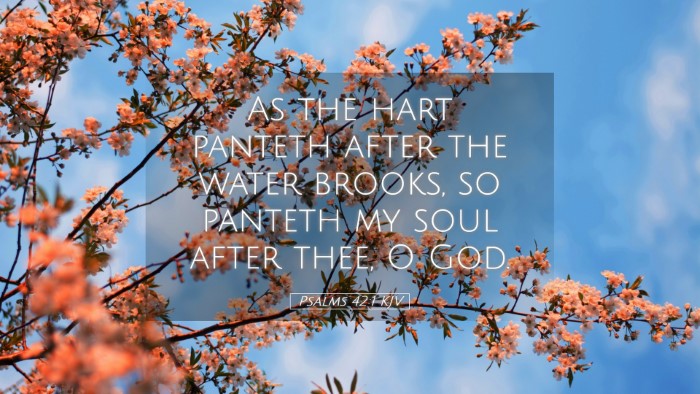Commentary on Psalms 42:1
Bible Verse: Psalms 42:1 - "As the deer pants for the water brooks, so pants my soul for You, O God."
Introduction
This verse provides profound insight into the relationship between the soul and God, characterized by a deep and yearning desire akin to that of a thirsty deer seeking water. As we explore the interpretations of this verse from various public domain commentaries, we observe themes of longing, spiritual thirst, and the quest for divine communion that resonate deeply with the human condition.
Analysis of the Verse
This verse uses a vivid metaphor that illustrates a universal need: the longing for God. The imagery of a deer, characterized by its beauty and grace, conveys a delicate yet intense craving for water, which symbolizes spiritual sustenance.
Metaphor of the Deer
Matthew Henry emphasizes that just as a deer must seek water to survive, the soul must seek God to thrive spiritually. This metaphor reflects a deep instinctual desire which is intrinsic to all living beings.
Albert Barnes notes that the 'deer' is often associated with feelings of loneliness and desperation, representing the soul's yearning not just for sustenance but for fulfillment found only in God, echoing a vital aspect of human existence.
Spiritual Thirst
Adam Clarke articulates that the 'panting' signifies more than a casual desire; it entails an urgent, powerful craving reflecting spiritual dry spells faced by individuals. It highlights how the soul becomes parched in the absence of communion with God, akin to a deer devoid of water in a dried-up brook.
This thirst is not merely a one-time experience but signifies a continual need for divine connection, as expressed in this verse. The 'water brooks' symbolize both the Word of God and the presence of God in worship and prayer.
The Context of Longing
The context of Psalm 42 reveals a psalmist who is in a state of distress, feeling distant from God and surrounded by despair. This verse can be viewed as symptomatic of the broader human experience of estrangement from God, life’s trials, and the deep-seated longing for restoration and joy in His presence.
- Spiritual Dryness: The metaphor provides a backdrop for understanding the emotional and spiritual state of individuals who feel abandoned or distant from God.
- Communal Aspect: According to Henry, this longing is often shared communally, as the psalmist likely expresses the shared experiences of the faithful in times of spiritual drought.
- Contrasting Emotions: The contrast between thirst and fullness serves as a reminder of the joy that comes from God’s presence compared to the barrenness of separation from Him.
Applications for Pastors and Theologians
This verse serves as a powerful reminder for pastors, theologians, and students of the emotional depth of spiritual longing. The implications of this text can guide pastoral care, emphasizing a responsive approach to the spiritual needs of congregants.
Pastoral Care
In light of this verse, Barnes suggests that ministers should acknowledge the yearning of individuals, offering guidance that leads to spiritual refreshment through prayer, scripture, and community worship. It prompts a pastoral responsibility to create environments where individuals can express their heartfelt longings and find comfort in God’s presence.
Theological Reflection
This verse invites deeper theological reflection on the relationship between humanity and God. It calls for a more profound exploration of the nature of God as the ultimate source of life and satisfaction. Clarke urges scholars and theologians to engage with the question of what it means to have a soul that 'pants' for God, encouraging discussions on spiritual fulfillment and existential purpose.
Concluding Thoughts
Psalms 42:1 encapsulates the essence of a soul yearning for the divine, reminiscent of the struggles many face in a world filled with distractions and despair. It challenges readers to reflect on their personal hunger for God and inspires them to seek out the 'water brooks' that will quench their soul’s thirst.
This commentary urges a return to the basics of spiritual life—understanding our need for God, nurturing our relationship with Him, and helping others to do the same. The urgent cry of the psalmist can resonate with every believer, reassured that, despite the times of drought or despair, God remains the ever-present source of renewal and hope.


